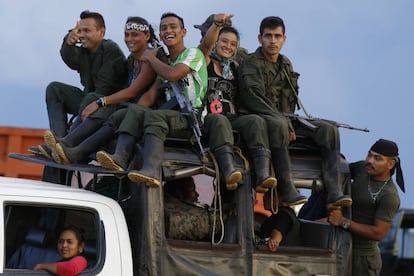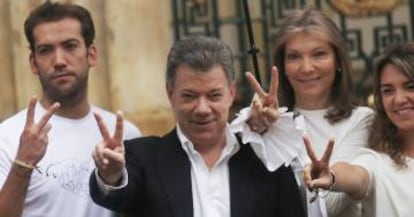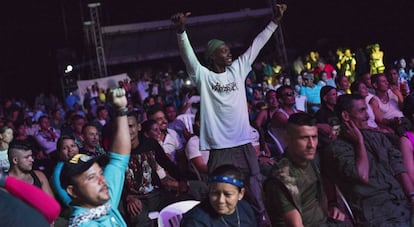Colombia’s FARC takes first steps on road to political mainstream
New alliance to act as parliamentary watchdog in lead-up to guerrilla group entering Congress
Just a matter of weeks after the Colombian government and the Revolutionary Armed Forces of Colombia (FARC) signed off on a new peace deal aimed at ending a decades-long conflict in the country, the guerrilla group has taken its first steps towards becoming a legal political force.

In a move marking the beginning of a process outlined in the peace accords, a political group with the name Voces de Paz y Reconciliación (Voices for Peace and Reconciliation) on Thursday registered with the country’s national electoral commission.
Made up of six members, the left-wing alliance will represent the FARC in the Colombian Congress until 2018, at which point the guerrilla group will be entitled to five senate seats and five seats in the lower house.
As specified in the peace deal, the newly registered group will have a voice in the lower house but no voting rights. Its job will be to act as a parliamentary watchdog ensuring that the hard-won Havana peace accords are honored.
Voices for Peace will act as a parliamentary watchdog ensuring the peace deal is honored
“We are here to ensure that the FARC enjoys the necessary prerequisites to become a party in Congress,” said Imelda Daza, the newly registered group’s most high-profile member. Daza is a human-rights activist and former member of the defunct Patriotic Union, a grouping that was formed by the FARC and the Communist Party in the 1980s and which grew out of peace talks headed up by former president Belisario Betancur in the same decade. More than 3,000 members of the Patriotic Union were later assassinated, among them two presidential candidates.
The six members of Voices for Peace come from a range of left-wing social and political movements but all have one common origin: the National University of Colombia. The group is keen to stress that none of its members belong to the FARC, although they have its blessing.
“We are not part of the FARC and for the moment we will not form part of any political party they create,” explained Jairo Rivera, political scientist and teacher at the university

Daza insisted the group’s work consisted in guiding the FARC on the road to full political participation. Its members did not consider themselves spokespeople for the guerrilla group, she said, explaining that because the FARC had not yet become “fully fledged citizens” any attempt to act as spokespeople for them could lead to “legal problems” for Voices for Peace.
“We are going to participate in all debates on laws and legislative acts related to the development of the [peace] accords,” said economist Jairo Estrada, who also acted as an advisor during the peace process.
“We will promote conversations with all parties who defend the peace in order to create a large consensus that will contribute to a government in transition,” said Pablo Cruz, one of the lawyers with the Voices for Peace group, reflecting the FARC’s strategy to move away from being a purely left-wing phenomenon.
We are not part of the FARC and for the moment we will not form part of any political party they create
Jairo Rivera, Voices for Peace
The first steps of the FARC toward becoming a legal political player in Colombia come at a fraught time. This week, the guerrillas expelled five leaders for failure to toe the group’s new “political and military” line and refusing to disarm. None of those leaders had any ideological weight but two of them had some influence in areas with an important guerrilla presence.
The reasoning behind the FARC statement on the decision is “to completely break any connection with drug-trafficking activities before guerrillas move to rural [concentration] zones [in the lead up to disarmament],” said Ariel Ávila, analyst and deputy director of the Peace and Reconciliation Foundation.
One of the FARC dissidents, known as John 40, is thought to have been among the group leaders most closely linked to the drug trade, while the case of Gentil Duarte has been the most surprising and worrying for the FARC’s leadership group, according to sources close to the guerrillas.

Duarte, a member of the FARC central organizing committee, participated in the Havana peace talks for 18 months and had been charged with stamping out dissidence in the FARC’s Frente 1 unit, which decided in June to make a break with the FARC’s central leadership group.
“The road to peace can’t be blocked by a group of fools who ignore the desire for peace on the part of the immense majority of people in our country and who are throwing themselves off the cliff of personal ambition while disguising themselves behind supposedly revolutionary phraseology,” said the FARC in a statement issued this week.
English version by George Mills.
Tu suscripción se está usando en otro dispositivo
¿Quieres añadir otro usuario a tu suscripción?
Si continúas leyendo en este dispositivo, no se podrá leer en el otro.
FlechaTu suscripción se está usando en otro dispositivo y solo puedes acceder a EL PAÍS desde un dispositivo a la vez.
Si quieres compartir tu cuenta, cambia tu suscripción a la modalidad Premium, así podrás añadir otro usuario. Cada uno accederá con su propia cuenta de email, lo que os permitirá personalizar vuestra experiencia en EL PAÍS.
¿Tienes una suscripción de empresa? Accede aquí para contratar más cuentas.
En el caso de no saber quién está usando tu cuenta, te recomendamos cambiar tu contraseña aquí.
Si decides continuar compartiendo tu cuenta, este mensaje se mostrará en tu dispositivo y en el de la otra persona que está usando tu cuenta de forma indefinida, afectando a tu experiencia de lectura. Puedes consultar aquí los términos y condiciones de la suscripción digital.








































